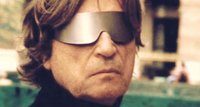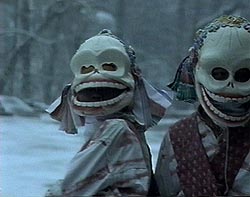
‘So through the eyes love attains the heart, for the eyes are scouts of the heart and the eyes go reconnoitring for what it would please the heart to possess…’
Black sun is an incredible documentary recounting the life of the French artist Hugues de Montalembert, who was blinded by an attack by muggers at his home in New York in 1978. Despite his profound disability, a few months on he is travelling in Indonesia.
This film is a sensory meditation on his interpretation of the world with one less sense. Incredibly moving and philosophical it is truly an impressionistic depiction, accompanied by a stream of images, of cities and landscapes; locations visited by de Montalembert on his travels. Throughout the viewer is reminded of all that we take for granted in looking. De Montalembert even compares the loss to castration. The artist describes the reactions of others; the extraordinary compassion  expressed and disinibition in confessing life's intimate details to a blind face.
expressed and disinibition in confessing life's intimate details to a blind face.
While throughout his story there is the inevitable melancholia as De Montalembert mourns for his loss, he also describes his celebration in being alive. It makes uplifting and life changing viewing.
Black Sun is being shown at the ICA until the 25th of May.
2 comments:
This sounds like a 'must-see'. Thanks very much Anna!
Thanks for recommending this, Anna. I found it very inspiring. De Montalembert has great strength of character -- he insists that he has not really 'changed' as person in spite of such a transformative and traumatic experience. The filmography was interesting too. Montages of images from around the world: one felt the irony of being able to see this rich variety. Yet De Montalembert had travelled, blind and alone, to these countries and could 'see' them in his mind as clearly as if his eyes were still functioning. It reminded me a bit of Bauby's book 'The Diving Bell and the Butterfly': both men have the ability to savour life, if a little wryly, because of, rather than in spite of, their impairment.
Post a Comment